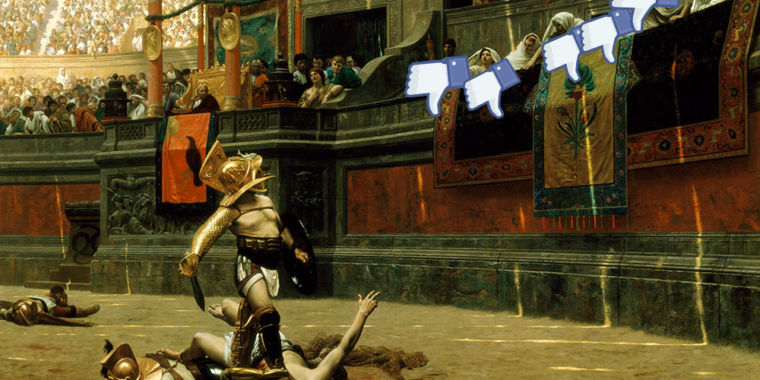
Jean-Léon Gérôme / Getty / Aurich Lawson
Facebook’s latest dalliance with a “downvote” button launched this week as a limited test in the United States. The feature began appearing on the service’s mobile app without a formal company announcement—and we only found out about it by browsing on our phones.
The feature appears to currently be limited to “public” posts. Should your account be flagged for this week’s test, every comment in a thread will include a numeric value and small up- and down-arrows connected to that number. Upon the first display of this Reddit-like change, the Facebook app will offer guidance: “Support comments that are thoughtful, and demote ones that are uncivil or irrelevant.”
-
The new Facebook upvote and downvote interface, as captured by an Ars Technica staffer from the Facebook iOS app, version 182.0.
-
A zoom on what a downvote looks like on the latest Facebook app. It simply turns the down-arrow blue—and doesn’t impact any counts for “likes” or other “emotion” emoji.
This is in addition to the site’s long-running “emotion” interface, which lets users tap “like” or emoji-styled buttons. These icons and numbers still attach to posts as they’ve done for years. Now an additional value based on up- and down-votes, appears as well, and these values are separate. Meaning, if you tap the “like” button and down-vote on the same comment, those actions don’t cancel each other out.
As of press time, these up- and down-vote numbers are not visible if your account is not flagged for the test. We have not yet seen this feature go live on any versions of the Facebook Android app.
Other territories, particularly Australia and New Zealand, have seen wider downvote tests since April of this year, while select users in the United States had access to a temporary downvote feature as early as February. Some overseas tests included a much longer prompt, titled “stop bad comments,” for those who tapped the down-vote arrow. “Press the down arrow if a comment has bad intentions or is disrespectful. It’s still okay to disagree in a respectful way,” the prompt read. That messaging currently does not appear in the American voting test.
In 2015, Facebook CEO Mark Zuckerberg promised a form of “dislike” button would eventually come to the platform, but that announcement appeared to be related to the wider spectrum of “emotion” buttons launched later that year.
Facebook did not immediately respond to Ars Technica’s questions about the feature.
Be the first to comment